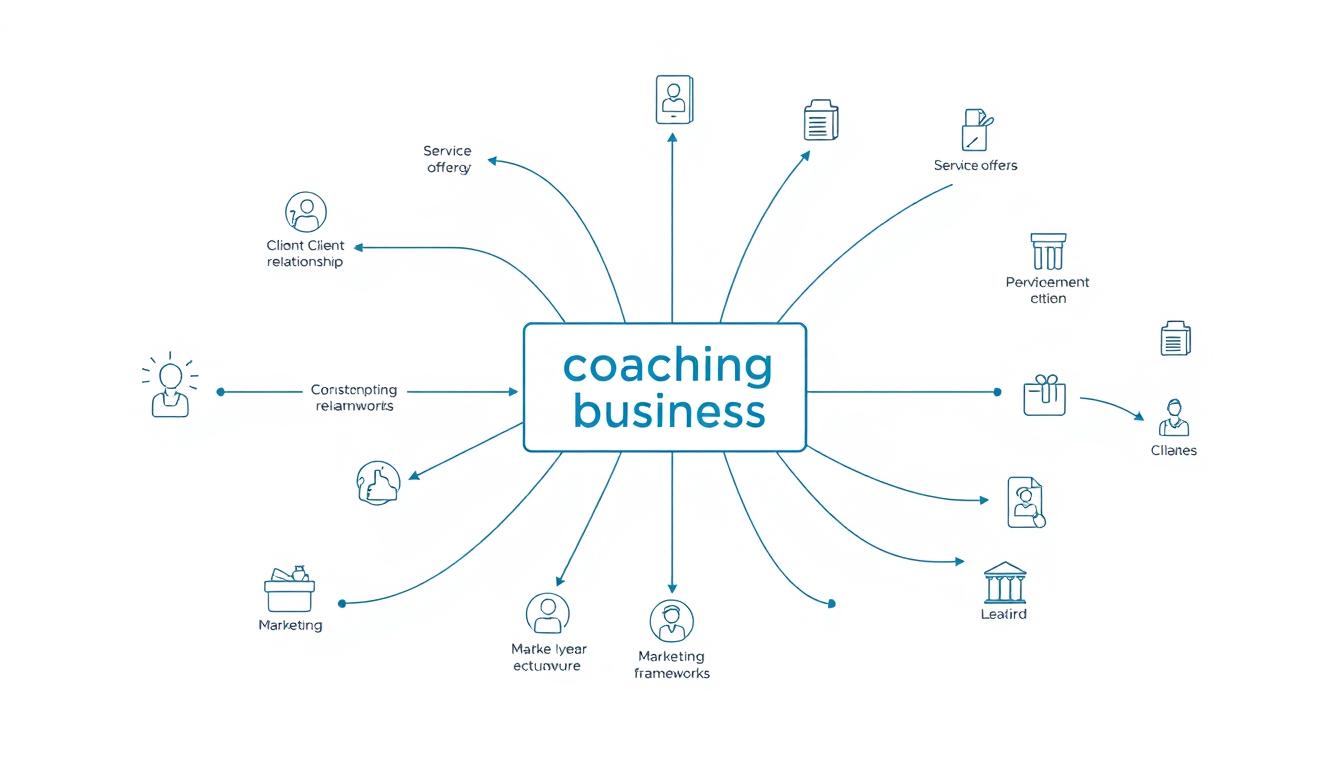Building a Coaching Career: Is Coach Before Business
Did you know the global coaching industry is set to hit $20 billion by 2026? This huge growth shows the increasing need for professional coaches in many fields. Aspiring entrepreneurs often wonder: Should they become a coach first, or start a business right away?
In this detailed guide, we’ll look at why starting as a coach can be a smart move. We’ll see how getting coaching experience can boost your business’s success. You’ll learn about the basics of coaching, industry standards, and key business points. This will help you build a successful coaching career that matches your interests and skills.
Key Takeaways
- The global coaching industry is projected to reach $20 billion by 2026, indicating immense growth opportunities.
- Gaining coaching experience before starting a business can provide strategic advantages in the long run.
- Understanding the foundations, competencies, and best practices of professional coaching is crucial for building a successful coaching career.
- Developing essential coaching skills, such as communication techniques and client rapport building, is vital for delivering high-quality services.
- Exploring business coaching certification and training requirements can help you establish credibility and expertise in the industry.
Understanding the Foundations of Professional Coaching
Starting a career in life coaching, executive coaching, or business coaching needs a solid foundation. This field is dynamic and rewarding. It covers many specializations and key skills for success.
Different Types of Coaching Specializations
Coaching offers many specializations, each for different client needs. You can choose from life coaching business and executive coaching business to specialized business coaching. Knowing these areas well helps you find your place and do well in the field.
Core Competencies for Successful Coaches
- Effective communication skills: Good listening, asking smart questions, and giving helpful feedback are key. They help build trust and guide clients.
- Emotional intelligence: Coaches need to understand people, feel empathy, and handle complex emotions. This creates a supportive and changing coaching experience.
- Problem-solving skills: Coaches must find challenges, understand their causes, and work with clients to find solutions.
- Continuous learning and adaptability: The business coach training world keeps changing. Coaches must keep learning and adapting to new trends and practices.
Industry Standards and Best Practices
The life coaching business, executive coaching business, and coaching world follow certain standards and practices. These ensure professionalism and ethics. Coaches must know these to offer great service and build a lasting practice.
“Coaching is not about fixing people, it’s about unlocking their potential.” – Sir John Whitmore
Is Coach Before Business: The Essential Question
The coaching industry debates a key question: should you become a coach first or start a business first? This question is at the core of starting a coaching business. The answer greatly affects the path of a coaching business venture.
Those who say “coach before business” believe in mastering coaching skills first. They think understanding client needs and market trends is essential. This approach helps build a strong <strong>coaching business plan and coaching business ideas.
On the other hand, the “business first” side emphasizes the need for a business plan. They believe starting a coaching business requires a strategic approach. This includes pricing strategies, marketing, and client acquisition.
Choosing between becoming a coach first or starting a business first depends on personal strengths and goals. The goal is to balance coaching expertise with a solid business foundation. This ensures both aspects support each other.
| Coach Before Business | Business First |
|---|---|
| Develop deep coaching expertise and understanding of client needs | Focus on building a strategic business plan and entrepreneurial mindset |
| Gain valuable insights to shape a more robust coaching business plan | Navigate the commercial aspects of setting up a sustainable coaching business |
| Establish a strong foundation for long-term coaching business success | Prioritize the business and operational aspects from the outset |
The decision depends on personal strengths, resources, and goals. The key is to find a balance between coaching skills and a solid business foundation.
Developing Coaching Skills and Expertise
Coaching is an art that needs a deep understanding of human behavior and effective communication. It also requires building trust and rapport with clients. As a business, entrepreneurial, or leadership coach, it’s key to improve these skills for better results.
Essential Communication Techniques
Good coaches are skilled at listening, asking questions, and giving feedback. They use active listening, open-ended questions, and empathy to create a supportive environment. This helps clients feel comfortable and engaged.
Building Trust and Rapport with Clients
Trust is the base of a successful coaching relationship. Coaches must create a safe space for clients to share their challenges and goals. Showing authenticity, keeping confidentiality, and showing genuine interest helps build strong rapport.
Creating Effective Coaching Frameworks
Experienced coaches often use their own frameworks in sessions. These frameworks may include goal-setting, problem-solving, and ongoing support. By refining their approaches, coaches can achieve better results.
“The greatest gift you can give someone is your own personal development.” – Jim Rohn
Improving coaching skills is a journey that leads to rewarding careers. Whether in business, entrepreneurial, or leadership coaching, the effort pays off.
Business Coaching Certification and Training Requirements
Aspiring business coaches often seek professional certification to prove their skills. These programs help validate their coaching abilities and fit into various coaching business models. Let’s look at the key aspects of business coaching certification and training requirements.
The International Coach Federation (ICF) is a well-known certification for business coaches. It sets standards and offers a detailed framework for training and accreditation. Getting an ICF credential, like the Associate Certified Coach (ACC) or Professional Certified Coach (PCC), shows a coach’s dedication to ethics and the ICF’s core competencies.
| Certification Program | Key Benefits | Training Requirements |
|---|---|---|
| International Coach Federation (ICF) |
|
|
| Certified Business Coach (CBC) |
|
|
Some coaches also get specialized business coaching certification, like the Certified Business Coach (CBC) credential. These programs focus on the unique needs of coaching business owners and entrepreneurs.
Getting business coach training is key to developing essential skills. This training covers communication, building rapport, setting goals, and creating coaching frameworks.
“Certification and ongoing training are paramount for business coaches to stay relevant and deliver exceptional value to their clients.”
By investing in business coaching certification and training, coaches become trusted advisors. They are ready to handle the complexities of the business world and help clients reach their goals.
Creating a Sustainable Coaching Business Model
To succeed in coaching, you need more than great skills. You must build a solid business model for lasting success. This part covers the essential steps to create a sustainable coaching business. We’ll look at pricing, service packages, marketing, and how to attract and keep clients.
Pricing Strategies and Service Packages
Finding the right price for your coaching is key. Think about your skills, the value you offer, and who you’re aiming for. Offer different packages, like one-on-one sessions, group programs, or ongoing services. Make sure your prices are fair but also help you stay in business.
Marketing Your Coaching Services
Good marketing is vital for a thriving coaching business. Use social media, create content, and network to find your audience. Build a strong online image with a great website and active social media. Use business coaching services to improve your marketing and find new clients.
Client Acquisition and Retention
Getting new clients is important, but keeping them is even more so. Use strategies like referrals, lead campaigns, and partnerships to attract clients. Focus on building strong client relationships, offering great value and support. This will lead to more business and word-of-mouth referrals, growing your coaching business plan.
Creating a solid business model makes starting a coaching business rewarding. Focus on pricing, marketing, and client care. This will help you build a successful coaching practice that adds lasting value to your clients.
Establishing Your Coaching Niche and Brand Identity
In the competitive world of coaching, it’s key to stand out. To succeed in a life coaching business, executive coaching business, or success coaching field, define your niche and brand well. This guide will help you find your unique coaching area and create a brand that attracts your clients.
Coaching covers many areas, like personal growth, business success, and goal setting. Start by finding where you shine the most. Are you great at helping people overcome personal hurdles, reach their full potential, or advance in their careers? Focusing on a specific area makes you an expert and helps you stand out.
After picking your niche, work on your brand identity. This includes your business name, logo, messaging, and style. Create a brand that shows who you are and what you offer. Think about how you want clients to see you – as a trusted advisor, a strategic partner, or a transformative guide. Being consistent in all your marketing is crucial for a strong brand.
“The most successful coaches are those who have carved out a distinct niche and built a brand that resonates with their ideal clients.” – John Doe, Renowned Business Coach
Your brand is more than looks; it’s about connecting with your audience. By matching your brand with your coaching skills and clients’ dreams, you’ll create a unique and memorable brand. This will help you stand out in the coaching world.
Building a Strong Online Presence for Your Coaching Practice
In today’s world, having a strong online presence is key for coaching success. It helps attract clients, show your skills, and grow a loyal fan base. Let’s look at how to make a big impact online for your coaching business.
Digital Marketing Strategies
Use many digital marketing ways to reach your audience. Make sure your website is easy to find with SEO. Also, use paid ads on Google and social media to get more eyes on your work. Don’t forget email marketing to keep in touch with your clients.
Content Creation and Social Media
Create top-notch content that shows off your coaching skills. Share helpful blog posts, videos, and social media posts. This builds trust and credibility. Also, talk to your followers on LinkedIn, Facebook, and Instagram to make real connections.
Website Development and SEO
Get a website that looks professional and is easy to use. Make it search engine friendly with the right keywords and a good layout. Keep an eye on your site’s performance and improve it based on data to get more visibility and leads.
“A strong online presence is the foundation for a thriving coaching business in the digital age. Embrace the power of digital marketing to connect with your ideal clients and showcase your unique value proposition.”
By using these strategies, you can create a strong online presence. This will help your coaching business grow. Whether you’re into startup, mindset, or business coaching, a solid online presence will make you stand out and attract the right clients.
Legal and Financial Considerations for Coaching Businesses
Starting a coaching business is more than just being a great coach. You also need to handle legal and financial stuff. This part talks about what you need to do to make your business last and stay legal.
Business Registration and Licensing
First off, you need to register and get the right licenses for your coaching business. This depends on where you are and how you set up your business. You might need to register as a sole owner, partner, or a company. It’s important to follow local and state laws to avoid trouble.
Contracts and Liability Insurance
Having good client contracts is key for coaching businesses. They should cover what you do, how you get paid, and what clients can expect. Also, getting liability insurance is smart. It helps protect your business from legal issues and keeps your finances safe.
Tax Considerations and Financial Management
Understanding taxes is a big part of running a coaching business. You need to know about income taxes, deductions, and credits. Good financial habits like invoicing, keeping track of money, and watching cash flow are also important. They help your business stay strong over time.
“A solid legal and financial base is the foundation of a successful coaching business. It lets coaches focus on their work and build strong relationships with clients.”
By tackling legal and financial issues early on, coaching businesses can set themselves up for success. This way, they can help their clients and keep their own business safe and growing.
Scaling Your Coaching Practice: From Solo Coach to Enterprise
Starting as a business coaching, life coaching, or executive coaching pro is exciting and tough. Moving from solo to a big team needs smart planning. You must focus on areas that help your business grow and stay strong.
Hiring and Training Support Staff
To grow your coaching, you’ll need a team of skilled people. This team might include admins, marketers, or more coaches. It’s key to train them well so they can offer top-notch service and keep your coaching standards high.
Expanding Service Offerings
As your business coaching, life coaching, or executive coaching business gets bigger, think about adding new services. You could start new coaching programs, workshops, or online courses. Make sure these new things fit with what your clients want and what you’re all about.
Creating Multiple Revenue Streams
Good coaching businesses have many ways to make money. Besides one-on-one coaching, you might offer retainer services, group coaching, or license your methods. Having different ways to earn money helps you stay strong even when things change.
Going from a solo business coaching, life coaching, or executive coaching pro to a big business takes smart planning. Focus on building a great team, adding new services, and finding different ways to make money. This way, you can grow your coaching business and make it last.
Conclusion
In this article, we’ve looked at why becoming a coach before starting a business is a great idea. We’ve seen how improving your coaching skills can help your business succeed. This foundation is key to your coaching business’s success.
Understanding coaching specializations and core competencies is crucial. It helps you build a strong coaching business model. With good coaching skills, you can create effective plans, build trust with clients, and deliver great results. These are vital for a successful coaching practice.
Starting a coaching business means finding the right balance. You need to master your craft and have a solid business plan. By combining your coaching skills with a good business model, you’ll create a business that grows and fulfills your passion.
FAQ
What are the different types of coaching specializations?
Coaching specializations include life coaching, executive coaching, and business coaching. There’s also entrepreneurial coaching, leadership coaching, success coaching, and mindset coaching. Each one focuses on different client needs and goals.
What are the core competencies for successful coaches?
Good coaches have strong communication skills and can build trust with clients. They know how to create effective coaching plans. They also follow industry standards and best practices.
Should one become a coach before starting a coaching business?
Getting coaching experience before starting a business is very helpful. It helps coaches develop key skills and understand client needs. It also gives them insights into the market, which can help their business succeed.
What are the essential communication techniques for coaches?
Coaches use active listening, powerful questioning, and empathetic communication. These help build trust and lead to meaningful client discussions. They’re important for both entrepreneurial and leadership coaching.
What are the certification and training requirements for business coaches?
Business coaches need specialized certification programs. These cover coaching methods, business strategy, and client engagement. Certifications help establish credibility and fit different coaching business models.
How can coaches develop a sustainable business model?
A sustainable coaching business model needs effective pricing and service packages. It also requires strategic marketing, focusing on client acquisition and retention. These steps help the business grow.
How can coaches establish a unique coaching niche and brand identity?
Coaches can stand out by focusing on specific niches, like life or executive coaching. A strong brand identity that connects with the target audience is key. This helps them shine in a competitive market.
What are the key considerations for building a strong online presence for a coaching practice?
A strong online presence includes digital marketing, engaging content, and social media management. It also means having a professional website and being easy to find online. These steps help attract clients.
What legal and financial aspects should coaches consider when starting a coaching business?
Coaches need to handle legal matters like registration, contracts, and insurance. They also must manage finances, including taxes, invoicing, and planning. A solid legal and financial base is essential for success.
How can coaches scale their coaching practice from a solo operation to an enterprise?
Scaling a coaching practice means hiring staff, expanding services, and finding new revenue streams. This approach works for various specializations, like business or life coaching. It helps grow the business.





